You cannot attack Russia. Yet, you can defend yourself from it. This is the indication given by NATO after the Ukrainian crisis, where the Russian involvement is “clear.” Anders Fogh Rasmussen, Secretary General of the Organization, was quite lapidary during his monthly press conference in Brussels. “I agree that there is no military solution to the crisis in Ukraine, but we have all plans in place to ensure effective defence and protection of our Eastern Allies against any threat, and we have all the means to do it.” Rasmussen pointed out that “each NATO activity is defence-oriented” and not offence-oriented, yet the world has suddenly changed lately. There is “a completely new security situation in Europe, less predictable and more dangerous.” That is why the Organization should “review and update defence plans” in order to “be ready to respond quickly to any threat, including where there is little warning.” A sentence aimed at European Allies in particular, with their dramatic cuts in defence budget, even though there is no room for cuts right now. “During the last five years, we have seen Russia increase its defence investments by around 10 percent per year, while some European Allies have cut their defence budgets by up to 40 percent.”
The situation is delicate, and Rasmussen did not underestimate it. “I am worried,” this is a sentence he repeatedly used during the press conference. Not only for Ukraine. After the situation worsened, there are now “more planes in the air, more ships at sea, and more exercises on the ground: we have deployed surveillance planes over Poland and Romania and we have reinforced our air policing mission in the Baltic region.” Currently, around 6,000 troops from across NATO are taking part in exercise in Estonia. And NATO will continue to do what is necessary, “as long as it is necessary.” No deadline yet, then. Everything, or at least most of the situation, is up to Russia now. Vladimir Putin had allegedly ordered the forces arrayed along the Ukrainian border to return to base: “Unfortunately, we haven’t seen any withdrawal at all,” said Rasmussen. “I strongly regret that, because a withdrawal of Russian troops would be a first important contribution to de-escalating the crisis,” he added. On the contrary, “We have seen illegal Russian military actions in Crimea. We have seen an illegal annexation of Crimea. There’s no doubt that Russia is deeply involved in the destabilization of the situation in eastern Ukraine.” Russia, added Secretary Rasmussen, “reserves the right to intervene in other countries to do what it calls protect the interests of Russian-speaking communities, and our concerns are definitely not exaggerate.”
Ukraine could even be ‘just a first step.’ Rasmussen considers the Kremlin’s policies as a return to the past which is concerning all Allies. Moscow wants to control all its formers satellites, then it will “increase pressure on Moldova as well as possibly on Georgia.” NATO does not know exactly which instruments Russia might use, they might include “gas prices, gas supply, trade restrictions.” There is little hope in Brussels for Putin to accept negotiations. The last time it happened was on March 5, 2014, during the latest meeting of the NATO – Russia Council. “Actually, we have suggested a new meeting in the NATO-Russia Council maybe to be held next week. But so far we haven’t heard from the Russians.”



![La bandiera della Regione Lombardia [foto: Wikimedia Commons]](https://www.eunews.it/wp-content/uploads/2022/09/lombardia.png.webp)







![Palazzo del Mercosur, targa [foto: imagoeconomica]](https://www.eunews.it/wp-content/uploads/2025/04/Imagoeconomica_2336393-scaled-e1743769770968-120x86.jpg)
